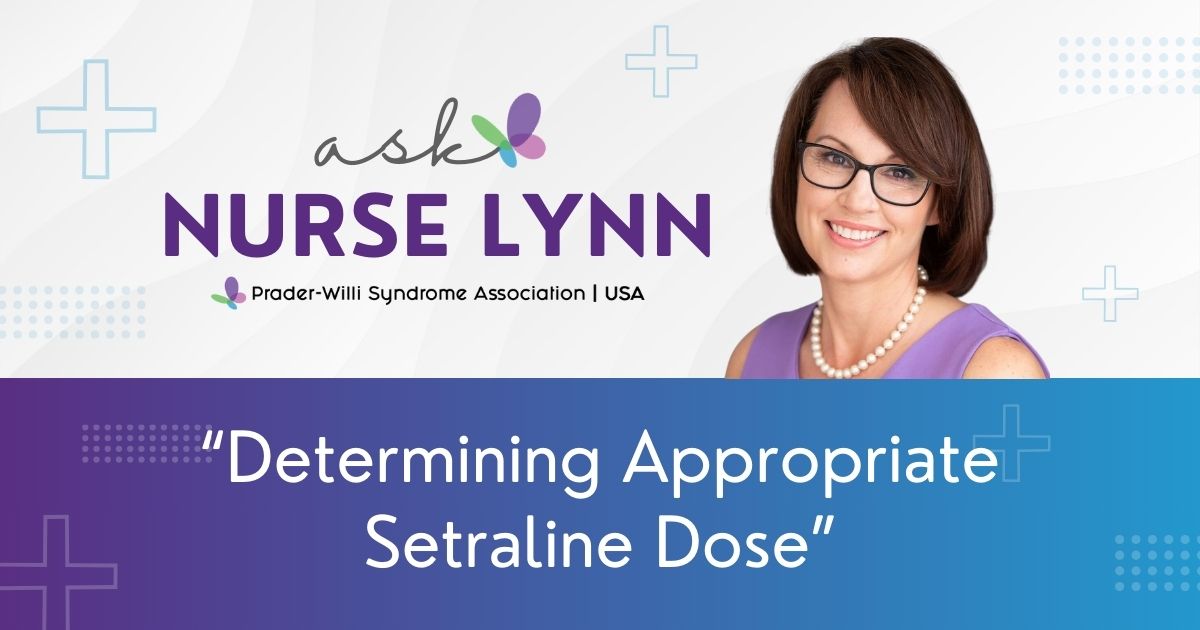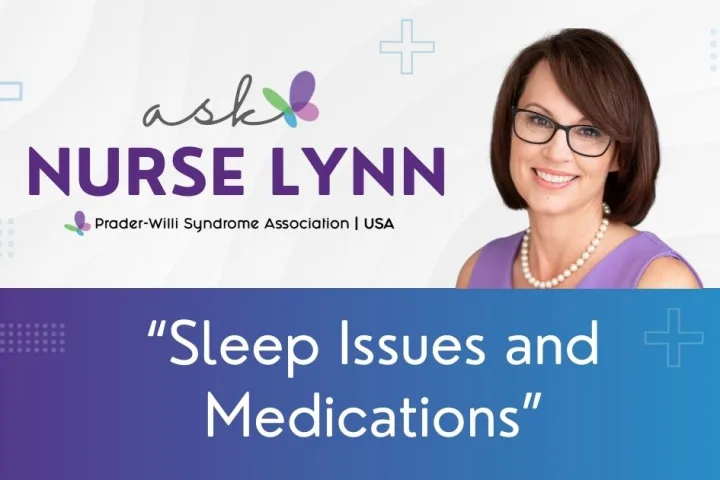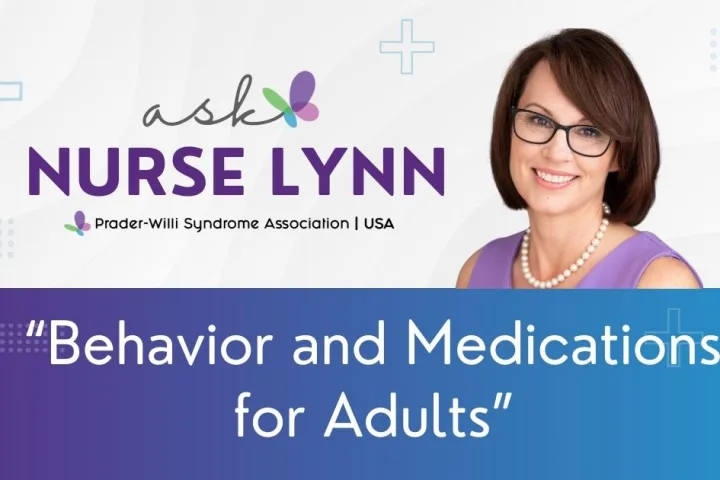Question:
Male, 19 years old, Deletion subtype
My son is on Sertraline (Zoloft) and has been on quite a low dose, so under 25 mg for quite a while, in November we put his dose up by 2ml every week so now he is on 50 mg, one pill in the morning and one at night. The sertraline is to reduce anxiety, perseveration, and to help with difficulty sleeping when he gets stuck. Often over the years, when we put the dose up, we wondered if it was adding to his anxiety and ramped up behaviours, so we were very slow to increase. So now, having upped the dose quite quickly, he settled for a week or two, and now is ramped up again. It is December, school schedule is all over the map with special activities, etc, but I wonder if we should go UP or DOWN. He is hyper, prior to dose increase he seemed depressed. Thanks
Nurse Lynn’s Response:
It sounds like you’re navigating a challenging balance with your son’s medication and external factors like the school schedule contributing to changes in behavior along with the whirlwind of the holiday season.
The “ramped up” behavior following a dose increase could potentially be a sign of activation or overstimulation from the higher dose of Sertraline. This is not uncommon in some individuals with Prader-Willi Syndrome and may signal that the dose is too high for his current needs. Mood activation can manifest as: increased agitation or restlessness, behavioral outbursts, sleep disturbances or, emotional dysregulation including sudden mood swings. Alternatively, if the lower dose previously seemed insufficient, it could indicate the need for fine-tuning rather than a straightforward increase or decrease.
The disruption to the school routine in December along with everything that goes along with the holiday season might be exacerbating anxiety or hyperactivity. This could temporarily amplify behaviors, making it harder to discern medication effects.
Share your observations about his behavior at different doses and environmental triggers. A slight adjustment (up or down) or returning to the previous dose could be discussed based on his recent history. Keep a daily log of his behaviors, mood, sleep, and activities. This can provide valuable insight for his doctor to assess whether the dose increase is beneficial or too stimulating. Focus on calming routines, sensory strategies, or other behavioral tools to help him manage the disruptions in routine during this time.
There is GeneSight testing that you may also want to suggest to your provider. This test analyzes a person’s genetic makeup to determine how their genes may affect how they respond to certain medications. The test results can help identify which medications are likely to be effective and well-tolerated for a particular patient. This is a test done at the office and is a simple cheek swab.
Do you have a question for Nurse Lynn? Submit your question here:
Share this!





 Perry A. Zirkel has written more than 1,500 publications on various aspects of school law, with an emphasis on legal issues in special education. He writes a regular column for NAESP’s Principal magazine and NASP’s Communiqué newsletter, and he did so previously for Phi Delta Kappan and Teaching Exceptional Children.
Perry A. Zirkel has written more than 1,500 publications on various aspects of school law, with an emphasis on legal issues in special education. He writes a regular column for NAESP’s Principal magazine and NASP’s Communiqué newsletter, and he did so previously for Phi Delta Kappan and Teaching Exceptional Children. Jennifer Bolander has been serving as a Special Education Specialist for PWSA (USA) since October of 2015. She is a graduate of John Carroll University and lives in Ohio with her husband Brad and daughters Kate (17), and Sophia (13) who was born with PWS.
Jennifer Bolander has been serving as a Special Education Specialist for PWSA (USA) since October of 2015. She is a graduate of John Carroll University and lives in Ohio with her husband Brad and daughters Kate (17), and Sophia (13) who was born with PWS. Dr. Amy McTighe is the PWS Program Manager and Inpatient Teacher at the Center for Prader-Willi Syndrome at the Children’s Institute of Pittsburgh. She graduated from Duquesne University receiving her Bachelor’s and Master’s degree in Education with a focus on elementary education, special education, and language arts.
Dr. Amy McTighe is the PWS Program Manager and Inpatient Teacher at the Center for Prader-Willi Syndrome at the Children’s Institute of Pittsburgh. She graduated from Duquesne University receiving her Bachelor’s and Master’s degree in Education with a focus on elementary education, special education, and language arts. Evan has worked with the Prader-Willi Syndrome Association (USA) since 2007 primarily as a Crisis Intervention and Family Support Counselor. Evans works with parents and schools to foster strong collaborative relationships and appropriate educational environments for students with PWS.
Evan has worked with the Prader-Willi Syndrome Association (USA) since 2007 primarily as a Crisis Intervention and Family Support Counselor. Evans works with parents and schools to foster strong collaborative relationships and appropriate educational environments for students with PWS. Staci Zimmerman works for Prader-Willi Syndrome Association of Colorado as an Individualized Education Program (IEP) consultant. Staci collaborates with the PWS multi-disciplinary clinic at the Children’s Hospital in Denver supporting families and school districts around the United States with their child’s Individual Educational Plan.
Staci Zimmerman works for Prader-Willi Syndrome Association of Colorado as an Individualized Education Program (IEP) consultant. Staci collaborates with the PWS multi-disciplinary clinic at the Children’s Hospital in Denver supporting families and school districts around the United States with their child’s Individual Educational Plan. Founded in 2001, SDLC is a non-profit legal services organization dedicated to protecting and advancing the legal rights of people with disabilities throughout the South. It partners with the Southern Poverty Law Center, Protection and Advocacy (P&A) programs, Legal Services Corporations (LSC) and disability organizations on major, systemic disability rights issues involving the Individuals with Disabilities Education Act (IDEA), Americans with Disabilities Act (ADA), and the federal Medicaid Act. Recently in November 2014, Jim retired.
Founded in 2001, SDLC is a non-profit legal services organization dedicated to protecting and advancing the legal rights of people with disabilities throughout the South. It partners with the Southern Poverty Law Center, Protection and Advocacy (P&A) programs, Legal Services Corporations (LSC) and disability organizations on major, systemic disability rights issues involving the Individuals with Disabilities Education Act (IDEA), Americans with Disabilities Act (ADA), and the federal Medicaid Act. Recently in November 2014, Jim retired.